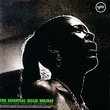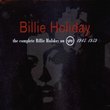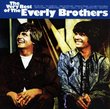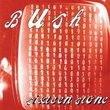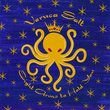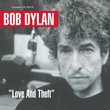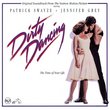| All Artists: Billie Holiday Title: Complete Commodore Recordings Members Wishing: 3 Total Copies: 0 Label: Verve Release Date: 1/28/1997 Genres: Blues, Jazz, Pop, Broadway & Vocalists Styles: Vocal Blues, Traditional Blues, Swing Jazz, Traditional Jazz & Ragtime, Vocal Jazz, Oldies, Vocal Pop, Traditional Vocal Pop Number of Discs: 2 SwapaCD Credits: 2 UPC: 011105040129 |
Search - Billie Holiday :: Complete Commodore Recordings
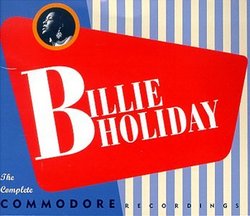 | Billie Holiday Complete Commodore Recordings Genres: Blues, Jazz, Pop, Broadway & Vocalists
In 1939 Lewis Allan's song "Strange Fruit" was a focal point of Billie Holiday's performances, a grimly poetic evocation of lynching delivered with tremendous dramatic power. It was so pointed a protest, however, that Colu... more » |
Larger Image |
CD DetailsSynopsis
Amazon.com essential recording In 1939 Lewis Allan's song "Strange Fruit" was a focal point of Billie Holiday's performances, a grimly poetic evocation of lynching delivered with tremendous dramatic power. It was so pointed a protest, however, that Columbia refused to record it. Milt Gabler arranged to record it for Commodore, his independent jazz label, and when it was paired with the sensual "Fine and Mellow," it became Holiday's first hit record. This two-CD set includes all the takes from the 1939 and 1944 sessions, and they're some of Holiday's finest moments in the recording studio, combining first-rate material and sympathetic support that includes pianist Eddie Heywood, drummer Sid Catlett, and trombonist Vic Dickenson. Holiday's vocal and interpretive skills were seldom as beautifully balanced as they are here. --Stuart Broomer Similar CDsSimilarly Requested CDs
|
CD ReviewsFANTASTIC COLLECTION OF BILLIE & THE SOUND IS SPLENDID! Jay Siekierski | STATEN ISLAND, N.Y. USA | 02/07/2003 (5 out of 5 stars) "All the old Commodore Jazz recordings have been taken over by MCA Records and an extensive reissue of the labels recordings is currently underway. One release that will instantly appeal to every Jazz fan is this new Billie Holiday 2 CD set The Complete Commodore Recordings. Of the 16 tunes featured you actually get a total of 45 tunes recorded between '39-'45 for the Commodore label because all are multiple takes with the exception of "On The Sunny Side Of The Street" & "Fine And Mellow". Some of the classics included are "I Cover The Waterfront (4 takes)," "Billies Blues" (3 takes), "Embraceable You" (2 takes) and probably the most controversial classic of all Billie's recordings...The landmark recording "Strange Fruit" offered in 2 different takes. The booklet is breathtaking! A walloping 40 pages full of great historical info on these recordings and the great Lady Day during these years is excellent. Rare pix, complete recording data and producers' info on putting this masterwork together is also included so you get the inside story correctly. All this material has been digitally remastered and should come as a very big surprise to many when you hear the playback. A must!" Jazzy Elegance, but still I love the Columbia sides better Tony Thomas | SUNNY ISLES BEACH, FL USA | 02/08/2005 (5 out of 5 stars) "This is good music. Billie makes some of her most outstanding performances here. These are the first sessions Billie had where her singing was the key element and the band's performance was subdued in order to sport and clarify her singing. Perhaps, this is a result of the general motion in the recording industry in the mid 1940s to acknowledge the singer, rather than the orchestra. Billie's previous work on Columbia was always issued under the rubric of some orchestra either the Billie Holiday Orchestra or the Teddy Wilson Orchestra, even though the recordings were done by whatever pickup group of members of the Basie Band or other big bands were in town at the moment. Instead of the kind of intros that we hear on the Commodore Sides, the band plays the whole tune a time or two before we hear the voice. This was just what people bought records for before the 1940s when the singer played a smaller role in all jazz and popular music. On these Commodore siese, we have a sustained group of performers who work with Billie on and off record, arrangements that seem to be more developed, and openings that seem to lead up right to her voice. Of course, "Strange Fruit" had a big political and artistic impact at the time, but I don't think it measures up as a performance to a number of the Jazz tunes on the CD. Myself, I tend to see it, along with John Hammond Sr. whom I otherwise detest in many regards, as part of an evolution of Billie away from being a Jazz singer towards seeing herself as more of a chanteuse of dramatic songs. Looking at her whole work, I think Billie did best when she was in a fully jazz environment and when she was recorded with musicians whose work challenged her. This was the case in the many recordings she did for Columbia in the 1930s and 1940s, To a certain extent this is also true in records she made in the early 1950s for Verve with Ben Webster and Sweets Edison presiding. The Commodore recordings are great. However, nothing compares except perhaps Louis Armstrong's working on pop tunes between 1928 and 1932 to the Columbia sides Billie cut with the likes of Buck Clayton, Lester Young, Johnny Hodges, Benny Goodman, Ben Webster, Freddie Green, Bunny Berrigan, etc. Nothing. Billie was more alive, her voice was stronger, there was more joy in her heart, and no heroin in her bloodstream. Above all, on these sessions she was challenged by a total jazz environment, Jazz masters of her calibre, and an improvisational freedom to the most of the Columbia sessions that seems to have died by the time we get to these Commodore recordings. Just one word about Mildred Bailey. Yes, Billie's work was a triumph compared to Mildred's. One can appreciate that because Bailey was jealous and spiteful to Billie when Billie first came on the scene. Famously, Bailey hired Billie's mother who catered parties, to cater one of her own parties in the early 1930s, knowing Billie's mother would bring Billie along to help serve the food to her guests. Bailey alledgedly gloated to her guests at the scene of Billie Holiday in a maid's uniform serving her guests and thus put in "her place." That wasn't nice. One gets the idea that Bailey who had significant Native American ancestry and who was the first well known white female Jazz singer trying to sing in Black style (Bailey had started doing this shortly after World War I), was a bit touchy about her own whiteness. In an age before television, Bailey continued to have fans white and Black who did not know she was white. This remains true even recently when I have loaned tapes of Mildred to other African Americans without any liner notes or anything and had them ask why they had never heard of this great Black singer. However, I do find it distressing that Mildred Bailey seems to be so forgotten. She was the first prominent female band singer in Jazz. She was and is fun to listen to and a great voice. Mildred was actually able to swing and swing hard even with Paul Whiteman. She produced masterpieces using some of the same small groups as Billie's for HER Columbia recordings, although Baily semed to prefer Herschal Evans to Lester Young. Bailey was also pretty out front for the time as a white female singer performing with an all black combo--"Mildred Baily and Her Oxford Browns." Mildred was simply magnificent in the small combos her husband Red Novro organized, She had a sense of humor about her performances and a bit of salaciousness that you won't find in Billie's recordings. I don't think it was just out of sentimentality, but in tribute to her artistry, that Sinatra and Bing Crosby (who owed his career to Bailey's bringing him in contact with Whiteman)spent thousands of dollars helping her out in the last years of her life when health problems and the end of her career led her to very hard times. More people need to listen to Mildred Bailey. I think I will put one of the Commodore disks and one of my Mildred Bailey disks on the CD player now and let the random mix blend all those good sounds together." Billie's Masterpieces Blues Bro | Lakewood, Colorado USA | 08/05/2004 (5 out of 5 stars) "The remastering is spectacular, great sound, better than what I expected. Includes a nice booklet with over 40 pages and session details. A casual fan will probably prefer to buy the master takes CD instead. The only thing about this CD I dont like is that hey should have put the alternates takes at the end, and all the master takes in sequence. But it is a stellar reissue all around."
|

 Track Listings (24) - Disc #1
Track Listings (24) - Disc #1
